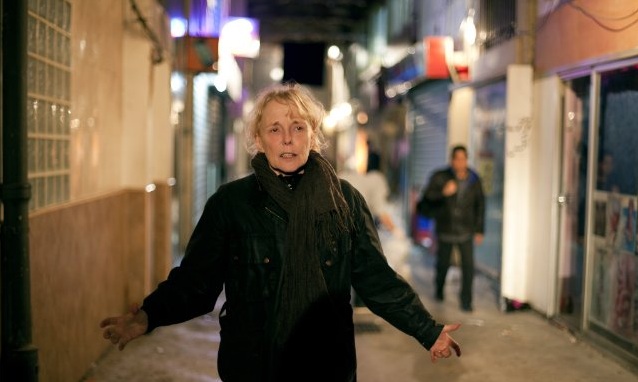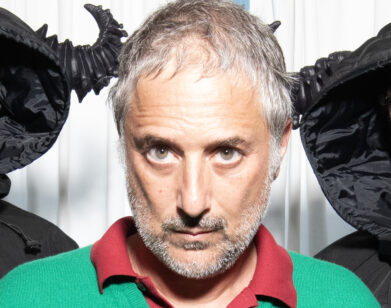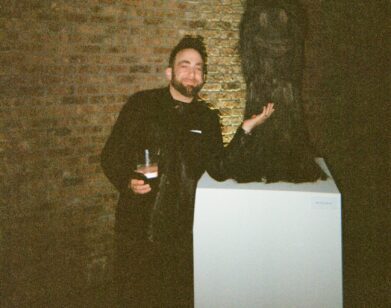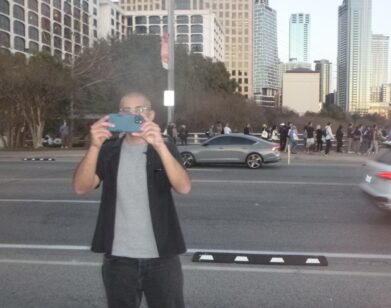Claire Denis, Under the Skin

ABOVE: CLAIRE DENIS ON THE SET OF BASTARDS. PHOTO COURTESY OF ALCATRAZ FILMS / WILD BUNCH / ARTE FRANCE CINEMA / PANDORA PRODUKTION
It’s been 12 years since French auteur Claire Denis shocked audiences with Trouble Every Day, her graphically violent and thoroughly disturbing vision of carnal desire as a form of cannibalism. Starring an unforgettable Beatrice Dalle as a woman afflicted with a disease that compels her to literally devour her lovers, the film was all the more disconcerting for being Denis’s follow up to Beau Travail, her critical breakthrough and arguably her most erotic and deeply romantic work—one that gave us some of the most indelible images of male beauty we are likely to see on screen.
But Denis has never been a predictable filmmaker. Over the course of 13 features in her now 25-year directorial career, she has never produced a film that wasn’t highly personal. Beginning with her striking debut Chocolat (1988), which she made after working as assistant director to Jacques Rivette, Wim Wenders, and Jim Jarmusch, and which draws on her memories of growing up in French East Africa, Denis has continued to explore characters living on the margins, an intimacy with the rituals of daily life, and above all an intense focus on the vicissitudes of desire.
As an image-maker, Denis has few rivals. She’s given us some of the most sensual and tactile moments in contemporary cinema, many of which are inextricably linked to a keen musical selection or an evocative score. The effect is intoxicating, even when the images may be difficult to look at. Who can forget the balletic legionnaires in Beau Travail synchronized to the strains of Benjamin Britten, or a wild-eyed Beatrice Dalle in white fur being dragged through a snowy landscape to the Tindersticks’ jagged guitar in The Intruder?
Her latest is no exception. Bastards, a contemporary thriller set to a droning electronic score, offers moments both exquisite and wrenching. It follows Marco (Vincent Lindon)’s return to Paris following his brother-in-law’s suicide, as he targets the aging billionaire businessman his sister (Julie Bataille) holds responsible for the tragedy. He rents an apartment and soon strikes up a relationship with the man’s wife, Raphaëlle (Chiara Mastroianni), but must confront his family’s sinister history when his young niece (Lola Creton) disappears and secrets begin to unravel.
Bastards is easily Denis’s darkest and most visceral film since Trouble Every Day. It’s a tale of power, corruption, and lies that circles around an illicit video of a startling act of sexual violation. The film had its New York premier earlier this month at the 51st New York Film Festival, and a veritable Who’s Who of the city’s downtown artist laureates, including long-time friends Jim Jarmusch and Isaach de Bankolé, Nan Goldin, and Kim Gordon, all came out to fête the director’s latest.
We sat down with the soft-spoken Denis, now 65, shortly before the screening to talk about the film’s origins in Kurosawa, its ’80s-inspired score, and her love of Alfa Romeos.
PAUL DALLAS: I was at the BFI in 2000 for the London premier of Beau Travail. During the Q&A afterward, the interviewer asked you about Trouble Every Day, which you were beginning production on. I remember you not having words to describe the film. It was as though you were stepping into brand-new territory, and it was frightening. I thought about the film again, because it’s being rereleased here.
CLAIRE DENIS: Yes, I know.
PAUL DALLAS It’s the only film I’ve ever walked out of. It was too much for me, at the time.
DENIS: The only film I’ve ever walked out of was [Pasolini’s] Salò. It took me three times to watch the whole thing. I think I always stopped at [the scene of] eating the nails. The first time, I had to leave! I came the week after to see the film [again], and I knew this scene was going to assault me. I said, “I will close my eyes and I will stay this time.” But I had to leave again. The third time, I made it.
DALLAS: Is it as hard to film violence as it is to watch it onscreen?
DENIS: No, it’s not easier. When we filmed the scene of Vincent Gallo attacking the little maid at the end of Trouble Every Day, we were all suffering. But it’s a completely different pain, because the suffering is [about being] sure that the scene is not going to affect the actors. It’s to protect them from suffering, or being too exposed. Like in Bastards, when Lola Créton is walking naked in the streets. I know the blood is fake, but my fear was to protect her. I didn’t want her to be exposed.
DALLAS: How do you make an actor feel comfortable?
DENIS: For that scene, the crew was not allowed to be there. I chose a street that had only empty offices, so there was no one around. She knows the light is on her. In that scene, Lola’s body is not naked. It’s in a special light. It appears like a metallic body—strong.
DALLAS: I agree. She seems to be in possession of her body.
DENIS: Yes, I would not have liked to expose a woman.
DALLAS: What made you want to tell the story of Bastards now, at this moment? Was it a story you’ve wanted to tell for a while?
DENIS: Maybe some part of it, yes. Maybe because it was just the opposite of 35 Shots of Rum. That film was all about love, and this is about something else. Maybe I was in a fierce or angry mood. I don’t know. I was like a person who wanted to scream at that time. I wanted to say something that was like a scream. Like, even [Marco in Bastards], he is working in the Navy and he’s well protected by his life, but even he could be a victim, too. I don’t know.
DALLAS: Was the story inspired by specific incidents in France, such as the prostitution scandal surrounding Dominic Strauss-Kahn?
DENIS: It exists everywhere, not only in France. I’ve seen a place that [like the barn in Bastards] in Texas once, a long time ago.
DALLAS: Was this when you were shooting Paris, Texas with Wim Wenders?
DENIS: It was much later. I had a friend in New Orleans and I [traveled to the U.S.] because I was worried about Hurricane Katrina. I landed in Dallas and rented a car … and I’ve seen a place like that. Everywhere in the world you have that.
DALLAS: When we enter the barn in the film, it feels like you get hit in the stomach. It’s such a queasy and sinister space.
DENIS: When you walk down the street in the early morning when people are cleaning the bars, you will feel like puking. It’s a human thing.
DALLAS: In Bastards, the men commit atrocities, but you make women equally culpable for their willingness to turn a blind eye.
DENIS: Of course. That’s true in life. I’ve never seen a world where only men were responsible for the violence and the women were innocent. They go together. Men and women are a violent mixture.
DALLAS: Michel Subor’s character can be seen as the pinnacle of evil. He has no remorse.
DENIS: Of course—he’s old and has nothing to loose.
DALLAS: At the same time, his wife Raphaëlle (Mastroianni) and Sandra (Bataille), the wife of his business partner, are also very scary, unpredictable characters.
DENIS: Yes, but I would be like them, probably. I’m not judging them. I think they did what they could.
DALLAS: The casting is interesting, because all the men are actors you’ve worked with over a long time, but the women are all actors you’re working with for the first time.
DENIS: Yes, but the small part of [Florence Loiret Caille], who plays the pregnant prostitute in Bastards, was also the maid in Trouble Every Day and was also in The Intruder. Chiara I’ve known for a very long time, but hadn’t worked with before. I also knew Julie, but hadn’t worked with her either. I wanted Lola immediately when I saw her in films.
DALLAS: She was recently in Mia Hansen-Løve‘s Goodbye First Love and Olivier Assayas‘ Something in the Air.
DENIS: Yes.
DALLAS: It’s interesting to see Alex Descas, Michel Subor, Vincent Lindon and especially Grégoire Colin age through your films. You first worked with Grégoire when he was 19 in U.S. Go Home (1994). The scene where he dances alone in his bedroom is so incredible.
DENIS: Yeah, to the Chuck Berry song.
DALLAS: It’s the one of your films that’s nearly impossible to find, but I’ll watch that scene on YouTube.
DENIS: I think Vincent Gallo [who had a part in U.S. Go Home] stole and has it, I guess. There was this problem with the music rights.
DALLAS: Bastards is your first feature shot digitally.
DENIS: I was curious to do it. I was already using my small digital camera, so I thought “let’s go, let’s try the [Canon] Red Epic, I would be interested.”
DALLAS: Does Agnès Godard, your longtime DP, have a preference?
DENIS: You cannot say you prefer this or that. [Digital] is a new way, and you have to understand it.
DALLAS: She achieves a wonderful range with the digital image, from the bright landscapes in Dubai to the shadowy interiors of the Parisian apartments.
DENIS: The darks are very difficult with the Red Epic, because it’s a camera that sees everything. To create obscurity is very difficult. Therefore, it was not fast. It took a long time to get the right look.
DALLAS: You’re working again with the Tindersticks on this film as well.
DENIS: Yes.
DALLAS: At the press conference, you joked that working with them is the product of misunderstanding—that you don’t entirely understand singer Stuart Staples’s Scottish accent and he doesn’t entirely understand your French accent.
DENIS: We’ve been working with each other for many years now, and we understand each other very well. We trust each other.
DALLAS: What is it about their sound that you really like?
DENIS: The first concert that I heard them, immediately I knew they were speaking to me. They were speaking to me. How else can I say it? They are great musicians.
DALLAS: What do you listen to at home?
DENIS: I listen to a lot of different kinds of music. When I was doing Beau Travail, I listened a lot to Benjamin Britten.
DALLAS: Music has always been such a big part of your films.
DENIS: I’m always afraid when I’m writing a script and I can’t hear the music. It means I’m not ready, that I’m not yet there.
DALLAS: You have a soundtrack in mind when you’re writing the film?
DENIS: Yes, but I will always leave it completely up to Stuart. Like when I was writing the script for Bastards, I told him that it had to be as cold as Tangerine Dream.
DALLAS: The soundtrack has a very ’80s sound.
DENIS: We used a Moog, like Tangerine Dream. We did only electronic music for this film.
PD: It’s a very different sound for the Tindersticks. I wasn’t sure it was them until the final song, when you hear Stuart’s voice.
DENIS: “Bring Your Love to Me” is so painful.
DALLAS: The song is paired with the grainy video images of the shocking footage shot in the barn. It’s beautiful and wrenching. Did you conceive of Bastards as a film noir?
DENIS: I was told this, but I don’t know. In the end, you can only be sure you’ve done a genre movie when you work for the film industry that tells you, “Let’s do a crime film.” When you’re working [as an independent filmmaker], you’re never really sure if it’s a noir or something else.
DALLAS: It has distinct elements of noir—the fatalism, the darkness, and of course the femme fatale. But it’s also more complicated.
DENIS: I was really inspired by Kurosawa’s noirs of the ’50s. He made two or three great ones just after the war with Toshiro Mifune. They’re always a big inspiration for me, because there’s no redemption in the end. That’s why I think they’re so powerful. There’s no redemption. I thought, if there was going to be redemption in Bastards, it would be like “what the fuck?” It would be weird. It would be fake.
DALLAS: All through the film, we’re following Marco as he’s losing one thing after another. The final confrontation between him and Chiara is really shocking.
DENIS: I’m not a fan of killing characters, but I thought that it was the most honest thing I could do in the film. It is shocking. [Marco] believes so strongly that he can change the outcome of things. It’s so unfair. He’s the real victim in the film.
DALLAS: Several of your previous films have circular structures that loop back on themselves. Here, it’s much more linear, even though it feels fragmented.
DENIS: I think a film noir demands a beginning and an end. And the end is when [Sandra] sees those images [of her daughter] and it’s too late.
DALLAS: What was the reason you made Vincent’s character the captain of a ship?
DENIS: Because I think it’s the perfect job for someone to have a very protected life. You cannot have a better life. You’re traveling, you’re commanding a ship, you have responsibilities, you have a good salary, and you don’t have to deal with the everyday problem of the family. That’s a dream.
DALLAS: When he’s on land, Marco drives a magnificent car.
DENIS: It’s an Alfa Rome Giulietta. It’s my favorite car.
DALLAS: It’s absolutely stunning.
DENIS: For me, a guy who is always on the sea making money and is never in town—if I was him, I’d have a Giulietta. This one is maybe from the ’70s. For me, nothing competes.
DALLAS: Have you ever driven one?
DENIS: Of course. All the crew was in love with it! A car like that is something you cherish.
CLAIRE DENIS’ BASTARDS IS OUT NOW IN LIMITED RELEASE.






